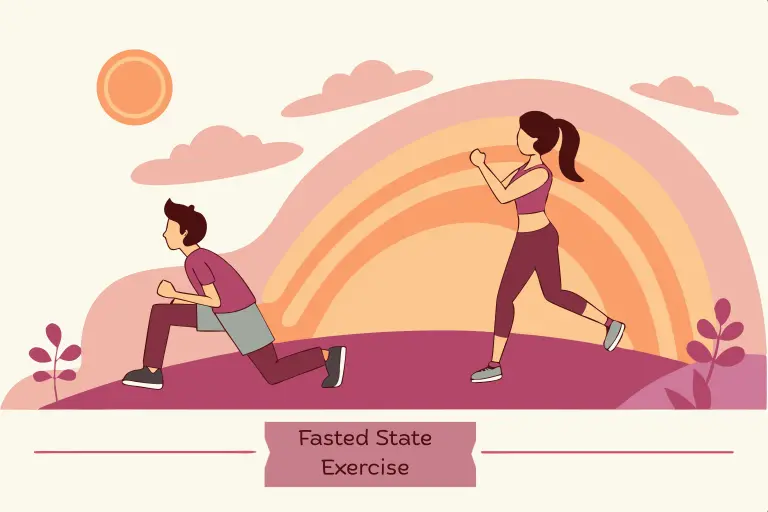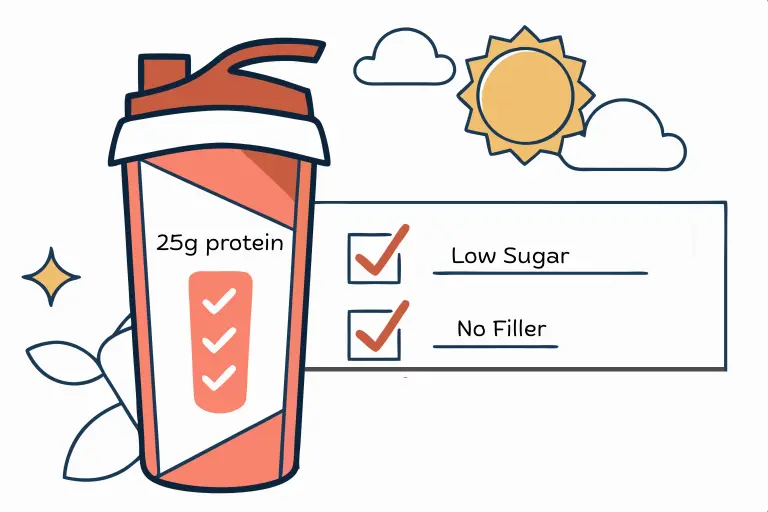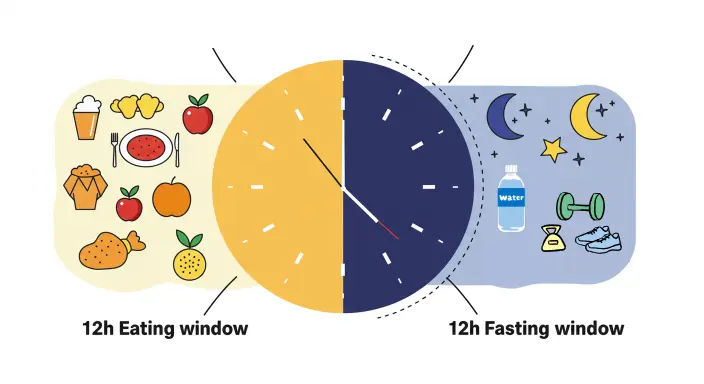Imagine this: You’re looking at fitness websites late at night (we’ve all done it), and you see a common question that confuses people who are new to this – does sleeping count as fasting?
Here’s the simple answer: Yes, sleeping does count as fasting. Your body keeps working even when you’re asleep. Those 7-8 hours of sleep can really help with your fasting.
We’re going to talk about how sleep can be like fasting. We’ll explore the science behind it, how to sleep for the best results, and what you should or shouldn’t eat during your fasting time. We’ll also discuss how to exercise in the morning when you’re fasting without feeling weak.
What Is Fasting? The Metabolic Definition
Before we get into the nitty-gritty of does sleeping count as fasting, let’s establish what fasting actually means on a metabolic level. Fasting isn’t just about skipping meals – it’s the complete absence of caloric intake.
Here’s something interesting: Fasting doesn’t start right away after you eat. Your body needs a few hours to digest food, usually 3 to 5 hours. During this time, your body is still working on the meal. Your insulin levels are high, and you’re using the sugar from the food for energy.
Fasting begins when your body stops digesting food and uses stored energy. That’s why it’s good to fast overnight. You’re not just avoiding food while you sleep. You’re also giving your body more time to burn fat.
Think of it this way: you eat dinner at 7 PM and don’t eat again until 7 AM the next day. You’re not just fasting for 12 hours. You’re actually fasting for 7-8 hours after your body digests the food (which takes about 3-4 hours). That’s the best part.
Does Sleeping Count as Fasting? Yes, and Here’s Why
The science behind this is clear. Studies using special tools to watch your metabolism have shown that sleep is when your body does some of its most interesting work during fasting.
When I first learned about this, I was amazed: how your body uses fuel changes like a U-shape while you sleep. Experts thought it would slowly switch from using carbs to using fat in a straight line. But that’s not what happens.
Instead, you start the night using up any sugar left over from the day. About halfway through your sleep, you burn the most fat. Your body releases more free fatty acids, and it’s like you’re running on stored fat while you dream.
Here’s the interesting part: as you get closer to waking up, your body starts using sugar again, getting you ready for the day. It’s like your body has a smart overnight routine that happens without you even knowing it.
Your blood sugar stays pretty steady during all of this, which shows your body is really good at this overnight fasting. Does sleeping count as fasting? Yes, and it might be the most active part of your fasting time.
How Overnight Fasting Affects Weight and Health
The research on this is very interesting. A study of adults in America showed that people fast for about 11.4 hours each night. But the time you start fasting is important.
People who started fasting early (before 2:19 AM) and fasted longer were 53% less likely to be overweight or obese. That’s a big deal. But those who started fasting late? They were more likely to have weight problems, even if they fasted longer.
This isn’t just a coincidence. There’s a good reason why fasting early works better. Your body’s natural rhythms, hormones, and energy systems work better when you eat according to your sleep schedule.
Yes, sleeping can be like fasting if you want to manage your weight. But when you sleep is important, not just how long. If you start your fast earlier in the evening and sleep through it, it can really help your metabolism.
Everyone is different. Women usually start burning fat earlier in their sleep than men. This gets less effective as we get older. So, how you fast while you sleep might need to change based on your body.
If you don’t sleep well, it can mess up these processes. If you still feel tired after 8 hours of sleep, try using green noise to sleep better or make your bedroom better for sleeping. Good sleep is just as important as getting enough sleep for fasting to work well.
Use Sleep to Help You: Your Morning Routine for Intermittent Fasting
Here’s how to use sleep to help with your fasting. Instead of just fasting overnight without planning, you can plan your last meal to get the most benefits.
The best time to eat? Finish eating 3-4 hours before you go to bed. This gives your body time to digest your food and start fasting while you sleep. So, if you go to bed at 10 PM, eat dinner by 6-7 PM.
Now, let’s talk about working out in the morning while fasting. This can be very effective. Working out when you haven’t eaten, especially after a long night of fasting, can help you burn fat and improve how your body uses insulin. Your body uses up its stored energy overnight, so exercise uses fat for fuel.
Working out in the morning while you’re also doing intermittent fasting is great for your body. You start burning fat right away, and then exercise helps you burn even more. It’s like getting extra benefits for your metabolism.
The important thing is to make your workouts hard, but not so hard that you’re exhausted. Try morning exercises that give you energy without tiring you out completely.

What You Can and Can’t Do While Fasting
Should You Take Vitamins While Fasting?
Many people wonder about vitamins. Should I take vitamins while fasting? It depends on the kind of vitamins.
You can usually take vitamins that dissolve in water (like B vitamins and vitamin C) while you’re fasting. They don’t have calories, so they won’t affect your insulin levels. Also, your body absorbs them better when your stomach is empty. If you feel tired, liquid vitamin B12 might be especially useful when you’re fasting.
Vitamins A, D, E, and K are different. Your body needs fat to absorb them. Taking these vitamins when you’re fasting won’t work. Wait until you’re eating and have a meal with healthy fats.
When you’re fasting and taking vitamins, it’s best to keep it easy: use vitamins that dissolve in water while you’re fasting. Save the vitamins that dissolve in fat for when you’re eating food.
Supplements and When You Fast
When you’re fasting and taking supplements, it’s a little tricky. Here’s the main idea: if the supplement has calories, it stops your fast. If it doesn’t, you’re probably okay.
Things you can do during your fast that are okay:
- Natural electrolytes for sustained energy (especially if you’re sweating during morning workouts)
- Black coffee (hello, appetite suppression and fat oxidation)
- Plain green tea
- Magnesium
- Salt (if you need it)
Fast-breakers to avoid:
- Protein powder
- MCT oil
- Anything with fake sugars that could make your body release insulin
- BCAAs (even though some people say they’re okay)
Doctors say you shouldn’t eat any calories while you’re fasting. If you’re not sure about a supplement, it’s best to wait and take it when you’re eating.
It’s very important to drink enough water when you’re fasting. Staying hydrated helps you have energy, and it’s even more important when you’re not getting water from the food you eat.

Best Protein Shake for Intermittent Fasting
First, let’s talk about when to use protein shakes. They’re for ending your fast, not for staying in it. When you do eat after a fast, especially after exercising in the morning, the right protein shake can really help you recover and get better results.
What to look for in your post-fast protein shake:
- 20-30g of high-quality protein (whey, casein, or plant-based)
- Minimal added sugars (under 5g ideally)
- List of ingredients that are good for you, with nothing extra added.
- It works quickly if you take it after you exercise.
When you work out in the morning while fasting, the timing is important. Your protein shake is what ends your fast and helps you recover. Your body is ready to send nutrients straight to your muscles at this time.
Some people start with a light meal to get back to eating. Then, they have their protein shake about half an hour to an hour later. Others just drink the shake right away. Pay attention to how your body feels. See what helps you digest food and gives you energy.

Beginner-Friendly Tip: Try the 12:12 Fasting Method
If you’re new to fasting and wondering if sleeping counts, the 12:12 method is a good starting point. It means fasting for 12 hours and eating for 12 hours. It’s easy to understand and works well with your sleep schedule.
Here’s how it works: Eat your last meal by 7 PM, and don’t eat again until 7 AM. That’s all there is to it. You’re just making your overnight fast a little longer.
The good thing about 12:12 is that you’ll be fasting while you sleep. You’ll wake up already 8-10 hours into your fast. You just need to wait another 2-4 hours, and you’re done.
This is a great way to start intermittent fasting without making big changes. Your body learns to use different energy sources. You’ll get a feel for longer fasts, and you’ll get used to the routine, which can help you fast for longer periods later.
Also, 12:12 fits well with your body’s natural clock. This helps you sleep better, have steady energy, and stick to it for a long time. It’s like an easy way to fast that you might want to keep doing.
If you feel tired during the day, learning about how your blood sugar and energy levels are connected can help you plan your meals to have energy all day.

How to Handle Energy While Fasting
Many people worry about having enough energy when they fast for a long time. The good news is that fasting can actually help keep your energy steady.
But, if you feel tired while fasting, you might want to check other things. Things like Chronic pain and fatigue can stop you from getting the good effects of fasting. Also, things that cause swelling and tiredness can have the same effect.
The foods you eat when you’re not fasting can affect how well your fast works. If you know which foods make you tired, and choose foods that help your body’s cells work better, your fast will be easier and more helpful.
If you feel tired in the afternoon while you’re fasting, think about changing when you fast or if something else is making you tired.
Sleep is like a secret weapon for your body’s fasting.
Yes, sleeping is like fasting! It’s probably the most overlooked part of your fasting plan. When you sleep for 7-8 hours, your body isn’t just resting. It’s a time when your body is really good at burning fat, balancing hormones, and making your energy systems work well.
Here’s the deal: Get good sleep, eat at certain times, and think about when you take your supplements. You could also work out in the morning when you’re not eating. This plan helps your body work better by using its own systems.
Sleep is already good for you. To make it even better, try sleeping at the right times, taking helpful supplements, and exercising in the morning.
Don’t forget how important sunlight is. Being in the sun is good for you and helps your body clock, which works well with fasting.
Want to learn more about making your fast work better? Check out our guides. They cover things like how to plan your workouts, when to take supplements, and how to build healthy habits that last. Your body will thank you for it.
Keep in mind: Everyone reacts to fasting differently. It depends on things like how old you are, if you’re a man or woman, and how healthy your body is. Start slow, pay attention to your body, and change things based on how you feel and what you can do.





